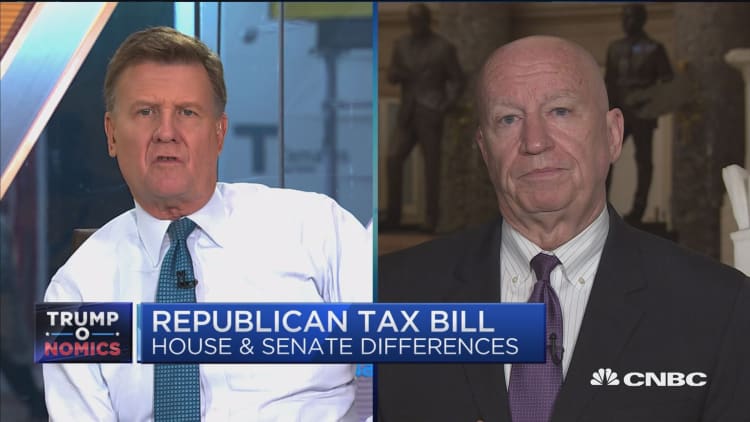
Households can expect to save an average of $1,200 in 2019 thanks to the Senate's proposed overhaul, but the largest tax cuts will go to the highest income earners.
Those are the findings of the Tax Policy Center's new analysis of the "Tax Cuts and Jobs Act."
In 2019, households across the board will save on taxes under the Senate's version of the bill. Those in the lowest quintile, with incomes below $25,000, would get an average tax cut of $40, while middle-income households earning between $50,000 and $87,000 would get an average tax cut of about $800, according to the Tax Policy Center.
For the top 1 percent of households — those whose income exceeds $750,000 — taxes would fall by an average of $28,000, the Tax Policy Center found.
"On average, there's a slight tax cut in the early years because of the doubling of the child tax credit and other provisions to offset the things that are being repealed," said Mark Mazur, director of the Tax Policy Center.
(Click here for an interactive chart on how the GOP tax plan could affect your wallet.)
But consumers may not benefit in the long haul. The Senate's tax cuts become less generous by 2027, averaging out to about $300, according to the Tax Policy Center. This is because nearly all of the individual income tax provisions expire after 2025.
"In later years, the Senate turns off almost all individual income tax provisions," Mazur said. "The higher child tax credit goes away after 2025."

The bill also uses the chained consumer price index as a measure of inflation for determining how tax brackets change going forward. Over time, this bumps individuals into higher brackets sooner.
(Of course, Senate and House lawmakers are now working to come up with a final version of the tax bill, and they still have some differences to resolve.)
Here are the six provisions that will determine whether the Senate's version of the tax bill is a winner or a loser for you:
Larger standard deduction
Like House Republicans, the Senate GOP contingent would also like to raise standard deductions, nearly doubling them to $24,000 for married couples who file jointly and $12,000 for single filers. That's an increase from today's standard deduction of $12,700 for married couples and $6,350 for singles.
But both the House and Senate plan to do away with personal exemptions, which are currently valued at $4,050 per person and which filers can take for themselves and qualifying dependents. Personal exemptions are particularly valuable to large families and single parents, as filers can take an exemption for each child.
Starting in 2018, the Senate will offer an increased child tax credit of $2,000 per child, up from $1,000. This break phases out for all taxpayers whose adjusted gross income exceeds $500,000. Be aware that this enhanced child tax credit will expire after 2025.
(The House, meanwhile, raises the child tax credit to $1,600, with a phaseout beginning at $115,000 for single parents and $230,000 for married couples.)
State and local taxes
Residents living on the coasts and other locales with high state and local taxes stand to lose from the Senate bill. That's because the Senate's proposal will do away with deductions for state income and sales taxes, a provision that's also in the House's bill.
These levies can be as high as 13.3 percent in California. Meanwhile, New York has a top marginal income tax rate of 8.82 percent.
Homeownership
The Senate is proposing a $10,000 cap on property tax deductions, an improvement from legislators' original idea to scrap this tax break altogether.
"People in high tax states are half-winners," said Tim Steffen, director of advanced planning at Robert W. Baird in Milwaukee. "This provision is better than it was before, but it's still not great."
Residents in the Garden State will feel this change most keenly: New Jersey has the highest mean effective property tax rate in the country, at 2.11 percent.
Three counties in New York, meanwhile, have the highest median property taxes and exceed $10,000, according to the Tax Foundation. They are Nassau County, Rockland County and Westchester County.
On a related note, while the Senate won't take away the deductibility of mortgage interest, homeowners would no longer be able to deduct interest on home equity loans.
Alternative minimum tax
The alternative minimum tax requires high income taxpayers to calculate their tax liability twice: Once under the framework for regular income taxes and again under the AMT rules, which eliminates certain deductions. Taxpayers are then required to pay the higher amount owed.
Although the House's proposal does away with the AMT, the Senate decided to keep the levy and raise the exemptions.
This year, the AMT exemption amount is $54,300 for singles and $84,500 for married couples who file jointly. The Senate calls for an increase in the exemption, boosting it to $70,300 for singles and $109,400 for married couples.
This increase is temporary and would return to the 2017 level, adjusted for inflation, after 2025.
Medical expenses
Breaking away from the House's proposal, the Senate will keep the deduction for medical expenses. Currently, you can deduct medical expenses to the extent they exceed 10 percent of your adjusted gross income.
The House would fully repeal this deduction. However, the Senate will expand your ability to deduct medical expenses for 2017 and 2018, allowing you to deduct costs to the extent they exceed 7.5 percent of AGI.
In 2019, the deduction will revert to 10 percent of your AGI.
Estate taxes
Like the House bill, the Senate proposal will double the estate tax exemption from its current level of $5.49 million per individual. This means that one person can transfer about $11 million to heirs without being subject to the estate tax, which is currently 40 percent.
Unlike the House, the Senate has shied away from repealing the estate tax altogether.
WATCH: Top House tax writer Brady expects final tax bill to repeal Obamacare individual mandate



